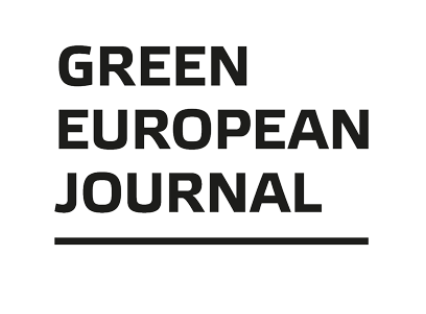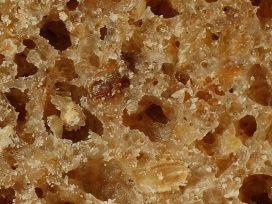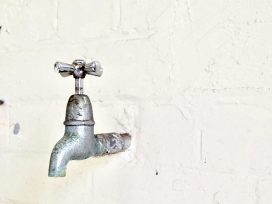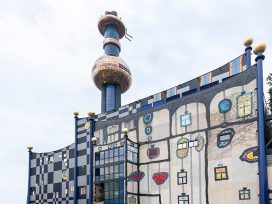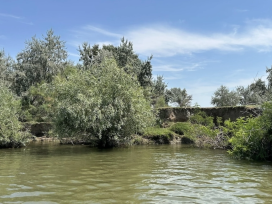Our toxic relationship with water
There seems to be too much of it, yet still too little. The vital compound that enables life on Earth is often taken for granted. As we go about our bustling urban lives, we begin to lose grip of what it demands of us. New talk show episode premiere.
Water just cannot seem to satisfy Europeans. Our infrastructure is often built in a way to try and get rid of rainwater as fast as possible. And yet, when it doesn’t rain, drought rears up its head.
Across the past decades and in many regions, precipitation has been steadily decreasing and we don’t seem to have a good solution for it. While we expect water to be readily available; on our beaches and in our cups, most of us are not willing to engage with its demands.
To understand our relationship to water, we must go beyond the tap. That is, at least, if we have the privilege of accessing water. In this episode, we talk about water solutions, humans and wildlife, and future cities.
Today’s guests
Ana Mumladze Detering is one of the co-founders of Schwimmverein Donaukanal, a Swimming Club in Vienna that aims to revive the urban swimming culture in Vienna’s Danube Canal.
Amelie Schlemmer is a textile artist and co/founder of Hybrids Dessous, a sustainable fashion brand creating hybrids suitable on both land and water.
Jakub Sigmund is a Bratislava-based researcher and the project manager of BROZ, an NGO safeguarding the natural waterways for over two decades.
We meet with them at The Alte Schmiede Kunstverein, Vienna.
Creative team
Réka Kinga Papp, editor-in-chief
Merve Akyel, art director
Szilvia Pintér, producer
Zsófia Gabriella Papp, executive producer
Margarita Lechner, writer-editor
Salma Shaka, writer-editor
Priyanka Hutschenreiter, project assistant
Management
Hermann Riessner managing director
Judit Csikós project manager
Csilla Nagyné Kardos, office administration
OKTO Crew
Senad Hergić producer
Leah Hochedlinger video recording
Marlena Stolze video recording
Clemens Schmiedbauer video recording
Richard Brusek sound recording
Postproduction
Nóra Ruszkai, lead video editor
Kateryna Kuzmenko dialogue editor
Art
Victor Maria Lima, animation
Cornelia Frischauf, theme music
Captions and subtitles
Julia Sobota, Daniela Univazo, Mars Zaslavsky, Marta Ferdebar, Olena Yermakova, Farah Ayyash
Related reads
Check out our focal point Breaking bread: Food and water systems under pressure
Further sources
Rising ocean acidification leads to anxiety in fish by Mario Aguilera, Scripps Institution of Oceanography in San Diego
Analysis: United Nations Water Conference 2023, Water Stewardship Asia Pacific
Troubled waters at the 2023 UN Water Conference by Anuka Upadhye, Planet Forward
Explainer: What climate models tell us about future rainfall, Carbon Brief
Disclosure
This talk show is a Display Europe production: a ground-breaking media platform anchored in public values.
This programme is co-funded by the Creative Europe Programme of the European Union and the European Cultural Foundation.
Importantly, the views and opinions expressed here are those of the authors and speakers only and do not necessarily reflect those of the European Union or the European Education and Culture Executive Agency (EACEA). Neither the European Union nor the EACEA can be held responsible for them.

Published 14 December 2023
Original in English
First published by Eurozine
© Standard Time / Eurozine / Display Europe
PDF/PRINTIn collaboration with
In focal points
Newsletter
Subscribe to know what’s worth thinking about.
Related Articles
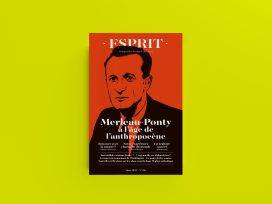
To have a body
Esprit 3/2025
Esprit revisits the philosophy of Maurice Merleau-Ponty: including Guillaume Le Blanc on ‘incarnation’; Corine Pelluchon on eco-phenomenology; and Judith Revel on Merleau-Ponty, ‘the eternal runner-up’.

Mineral rush
Topical: Critical raw materials
Why does peace in Ukraine hang on a ‘mineral deal’ whose handling is more reminiscent of trade than negotiations? Perhaps because the global race for critical raw material mining is well and truly underway, digging for today’s equivalent of gold: raw earth elements and lithium critical for renewables and digital technology but also modern weaponry.
